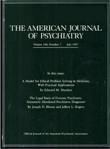The significance of past mania or hypomania in the course and outcome of major depression
Abstract
Patients with primary major depression (N = 372) were followed for 2 years to determine the prognostic importance of past manic or hypomanic episodes. While bipolar I and bipolar II patients were more likely to relapse and bipolar I patients were more likely to attempt suicide, these patients resembled nonbipolar depressed patients in likelihood of recovery and psychosocial impairment in various areas. Compared to nonbipolar patients, those with bipolar I depression were much more likely to develop mania, while bipolar II patients were more likely to develop hypomania. Cycling during the index episode predicted a relatively low likelihood of recovery for bipolar I patients but had no apparent prognostic significance for patients with bipolar II illness.
Access content
To read the fulltext, please use one of the options below to sign in or purchase access.- Personal login
- Institutional Login
- Sign in via OpenAthens
- Register for access
-
Please login/register if you wish to pair your device and check access availability.
Not a subscriber?
PsychiatryOnline subscription options offer access to the DSM-5 library, books, journals, CME, and patient resources. This all-in-one virtual library provides psychiatrists and mental health professionals with key resources for diagnosis, treatment, research, and professional development.
Need more help? PsychiatryOnline Customer Service may be reached by emailing [email protected] or by calling 800-368-5777 (in the U.S.) or 703-907-7322 (outside the U.S.).



